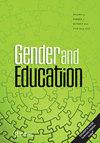芬兰基础教育核心课程设计:性别二元论问题
IF 1.9
3区 教育学
Q2 EDUCATION & EDUCATIONAL RESEARCH
引用次数: 0
摘要
摘要本文通过考察2014年芬兰基础教育核心课程审议设计过程中性别平等话语与性别二元不平等之间的关系,提出了一种新的教育平等政策过程视角。该分析将Nancy Fraser的三维正义理论应用于反馈评论(n = 73)以及核心课程草案和最终课程中包含的平等声明。该研究展示了性别平等话语如何肯定或转变性别二元不平等,以及它们如何改变课程版本之间的陈述。研究结果表明,在课程设计过程中,转变性别二元主义可能是对促进平等的挑战:没有单独的话语能够改变二元主义,只有肯定二元主义的话语才能改变最终的课程。本文认为,再分配平等话语与承认平等话语的结合有助于性别二元主义的转变,使其成为教育平等话语的核心要素。本文章由计算机程序翻译,如有差异,请以英文原文为准。
Designing the Finnish basic education core curriculum: the issue of gender binarism
ABSTRACT This paper presents a novel process perspective on educational equality policies by examining the relationship between gender equality discourses and gender binary inequalities in the deliberative design process of the Finnish Basic Education Core Curriculum 2014. The analysis applies Nancy Fraser’s theory of three-dimensional justice to feedback comments (n = 73) and the equality statements included in the draft and final core curricula. The study demonstrates how gender equality discourses affirm or transform gender binary inequalities and how they changed statements between curriculum versions. The findings show that transforming gender binarism was possibly a challenge to promoting equality in the curriculum design process: No discourse alone was able to transform binarism, and only discourses affirming binarism changed the final curriculum. This paper argues that a combination of redistributive and recognitive equality discourses can contribute to the transformation of gender binarism to make it a core element of educational equality discourses.
求助全文
通过发布文献求助,成功后即可免费获取论文全文。
去求助
来源期刊

Gender and Education
EDUCATION & EDUCATIONAL RESEARCH-
CiteScore
5.20
自引率
9.10%
发文量
31
期刊介绍:
Gender and Education grew out of feminist politics and a social justice agenda and is committed to developing multi-disciplinary and critical discussions of gender and education. The journal is particularly interested in the place of gender in relation to other key differences and seeks to further feminist knowledge, philosophies, theory, action and debate. The Editors are actively committed to making the journal an interactive platform that includes global perspectives on education, gender and culture. Submissions to the journal should examine and theorize the interrelated experiences of gendered subjects including women, girls, men, boys, and gender-diverse individuals. Papers should consider how gender shapes and is shaped by other social, cultural, discursive, affective and material dimensions of difference. Gender and Education expects articles to engage in feminist debate, to draw upon a range of theoretical frameworks and to go beyond simple descriptions. Education is interpreted in a broad sense to cover both formal and informal aspects, including pre-school, primary, and secondary education; families and youth cultures inside and outside schools; adult, community, further and higher education; vocational education and training; media education; and parental education.
 求助内容:
求助内容: 应助结果提醒方式:
应助结果提醒方式:


